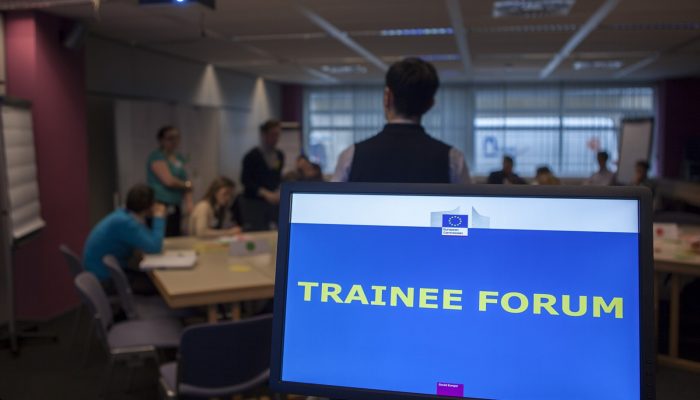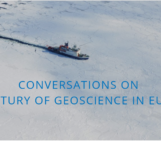
This month’s GeoPolicy blog will examine science-policy internships, fellowships, secondments and pairing-schemes in closer detail – highlighting the reasons for undertaking a placement and interviewing Dr Michelle Cain, an EGU member who participated in NERC’s Policy Placement Fellowship Scheme
Science-policy placements provide scientists with the opportunity to use their knowledge within a policy-orientated organisation. This could include working with a local government, supporting an NGO or undertaking a project within a larger political body such as the UN or the EU.
There are many reasons that you may decide to take a temporary sidestep from your current career path to a science-policy placement. Undertaking a placement gives you a chance to try something new. Even if you are completely satisfied with your current position, working in a different sector is likely to expand your skill set, illuminate research topics you may not have considered and open up new networks and opportunities to share your research. Taking a step away from your research for a limited period of time may also allow you to look at it with fresh eyes or from a different perspective. Furthermore, it can prepare you for contributing to the policymaking process directly through processes such as the Register of Commission Expert Groups.
On a metalevel, science-policy placements can help integrate science and policy by creating channels for communication and generating a shared understanding about how both academic and policy sectors function.Science-policy placements come in many different forms. They can be as short as one week or as long as four years with variants suitable for researchers at all career levels. The four, primary science-policy placement categories are outlined below:
- Internships are normally aimed at students or early career scientists and are typically for a period of between three and six months. Science-policy internships can be found in a plethora of organisations and sectors. Despite not always being paid, internships are a great way to gain an understanding of the science-policy interface and the different roles that exist.
- Fellowships are aimed at early to mid-level career professionals who are able to contribute their knowledge and skills to the organisation that they join while allowing them to simultaneously learn new skills to enhance their own expertise. It should be noted that the term ‘fellowship’ is used very broadly and as a result fellowships schemes can range from a paid internship to a secondment in both functionality and fellow responsibilities.
- Secondments allow employees to temporarily change roles within the same institute or with a partner organisation. Secondments are believed to expand both the skillsets and interests of the employee, thereby increasing their motivation and ability. Secondments can last from a couple of months to four years and can be on a full time or part-time basis. The employer generally continues to pay the researchers’ wages although the hosting organisation may also supplement their income. This is an excellent option for researchers who are happy with their current position but would like to try something new.
- Pairing Schemes involve researchers and policymakers sharing their experiences by spending one week to a few months at each other’s place of employment.
Despite working as the EGU Policy Officer and with policymakers for the last couple of years, I have never undertaken a science-policy placement. So, I decided to interview Dr Michelle Cain, an EGU member who participated in NERC’s Policy Placement Fellowship Scheme, to get a first-hand insight into the benefits and challenges of being involved with a science-policy placement.
During her 18 month NERC Policy Placement, Michelle worked two days per week advising the UK’s Department for Environment Food and Rural Affairs (Defra) on air quality modelling while continuing her own research. Although she was taken on as the expert within the Department, Michelle was “[…] surprised by how knowledgeable the policy staff were on specific air quality models and the science behind the policy”.
I was surprised by how knowledgeable the policy staff were on specific air quality models and the science behind the policy.
Michelle noted that working in the government department was a “very different world to that of a Post Doc” with “very quick deadlines” and with research topics “determined by the upcoming needs of policymakers” rather than her personal interest. Michelle believed that many scientists may also struggle with the concise nature of the policy briefs as, “most research needs to be summarised in 1-2 pages”.
Despite some of the challenges, Michelle believed her experience with Defra improved her “ability to communicate to a wider audience and pinpoint the most critical pieces of information”. She believes this not only helps her to “communicate research more thoroughly to policymakers but also to the general public as well as friends and family”. The experience also connected her with people working in policy who she would not have known otherwise and who she feels that she can still communicate her research with even though the placement has ended.
The [NERC Policy Placement] improved my ability to communicate to a wider audience and pinpoint the most critical pieces of information.
Michelle believes “the process behind getting science into decision-making is usually too opaque” but by undertaking the placement she was able to “gain an insight into the potential opportunities and avenues that do exist to share my research”. Although it might not be for everyone, Michelle said she would “recommend a similar placement to anyone who was interested in the policy realm or who was thinking about moving in that direction”.
What else should you consider before applying for a science-policy placement?
A few other things you may want to consider before applying for a science-policy placement include: the location (e.g. whether you would like to stay in your current city or perhaps go to an area geographically relevant to your research), the type of organisation (e.g. local government, a regional level institution or a private but politically-orientated organisation) and the skills or knowledge that you would like to gain (e.g. how to present your research to policymakers, how science is used in policymaking or event organisation).
See the EGU Geoscience Policy Internship, Fellowship and Secondment Opportunities to learn more about specific science-policy placements in Europe and around the world. You can also email policy@egu.eu for more information or sign up to the EGU Database of Expertise for regular science-policy updates.





